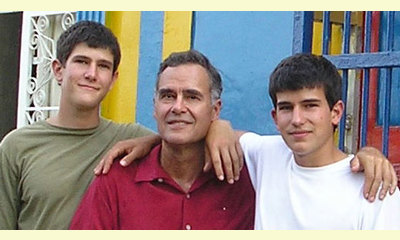|
|
Cuba and Venezuela shape new generation of "Revolutionary Doctors"
an article by W.T. Whitney Jr., Peoples's World (abridged)
In his book, "Revolutionary Doctors,". . . Brouwer traces the evolution of Cuba's health system that has led to Cuban-Venezuelan collaboration in providing health care for their people and medical assistance throughout the world. . . Touching upon recent Latin American political history, "Revolutionary Doctors" sets the stage by reviewing Latin American expressions of "socialism of the 21st century." It centers on momentous Cuban-Venezuelan experimentation in medical education, while outlining Venezuela's efforts to provide health care for 80 percent of its population, previously underserved. . .

click on photo to enlarge
The Bolivarian Alliance of the Peoples of Our America, the solidarity alliance known as ALBA , receives special emphasis. Brouwer reports on Cuba's Latin American School of Medicine that over six years annually has prepared 1,500 new doctors to take up medical work in dozens of home countries.
The author lived in the hillside village of Monte Carmelo on the outskirts of Sanare, a small city in Venezuela's northwest. There he came to know people from poor families who, astoundingly, were studying medicine without leaving home. He became acquainted with Cuban doctors who were both caring for patients and teaching the students. . .
That Cuba since 2004 has maintained some 15,000 physicians in Venezuela is crucial to this endeavor and also to meeting Venezuela's unmet health care needs. Along with thousands of other health workers, teachers, and "sport-trainers," Cuban doctors provide basic services, especially in poor urban barrios and rural areas. Newly trained Venezuelan doctors will eventually take over their work. Brouwer's book details Venezuela's health care reorganization, the work of Cuban doctors, and the doctors' Herculean efforts to become pedagogically qualified in order to double as teachers.
Readers learn about tens of thousands of Cuban doctors who've worked in over half the world's countries. Brouwer tells how since 1998 Cuban health workers have provided most of the medical services in Haiti, especially in rural areas. Numbers the author cites testify to the vast scope of this medical revolution. With a combined population of 39 million, Venezuela and Cuba now provide free medical education for 73,000 medical students. By contrast, the United States, population 307 million, is educating 70,000 future doctors. . .
Readers should note that Cuba's health care efforts began long ago. Writing in the New England Journal of Medicine, Robert Ubell in 1983 noted Cuba's burgeoning specialty medical services, growing research capabilities, effective first-contact and preventative health care, doctors working abroad, and new medical schools and hospitals. He describes "a national medical program that is the envy of many developing nations. For some of these nations, it is not Boston, Massachusetts, but Havana, Cuba, that is the center of the medical world."
"Revolutionary Doctors" by Steve Brouwer is published by Monthly Review Press, 2011, 256 pages, $18.95.
|








|
DISCUSSION
There is no question yet associated with this article.
* * * * *
Latest reader comment:

|
|








